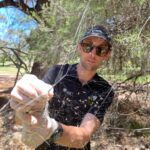Curtin University research into the health and wellbeing of lesbian and bisexual women has found three areas of concern – cervical cancer screening, drug use and violence.
The WA Lesbian and Bisexual Women’s Health survey, conducted by Curtin University’s WA Centre for Health Promotion Research (WACHPR) in conjunction with Sydney University, found their use of legal and illegal drugs is higher than the general community; they are reluctant to get Pap smears; and experience violence, including domestic violence.
Almost 900 women were surveyed, with the average age of respondents being 26.
Ms Jude Comfort, from WACHPR, said some of the key findings could surprise or alarm the lesbian, gay, bisexual, transgender and intersex (LGBTI) community.
“The findings all help in building a picture of the community and provide direction to work with this community to improve their health,” Ms Comfort said.
The survey found 27 per cent of respondents had never had a Pap smear and a further 8 per cent had last had one more than three years ago.
“This is an important screening tool for cervical cancer. The numbers suggest a poor understanding that lesbians need pap smears,” Ms Comfort said.
The survey also found that lesbian and bisexual women use legal and illegal drugs at higher rates than the general community.
A third of respondents reported smoking tobacco, which included 43 per cent of 16 to 24 year olds. Nationally, 15 per cent of Australians smoke.
“Smoking rates that are twice the national average are a huge concern especially as tobacco smoking is the single most preventable cause of ill health and death in Australia,” she said.
She said alcohol was the other drug widely used. While 86 per cent of the sample reported they drank alcohol, which is similar to the broader population, levels of risky drinking were higher.
Almost half of the respondents indicated they drank more than the National Health Medical Research Council guidelines recommended to reduce the lifetime risk of alcohol related disease or injury.
Nearly one third drank at levels considered risky on a single drinking occasion, also known as ‘binge drinking’.
“In the six months prior to the survey nearly half of the women had used an illicit drug – 36 per cent had used cannabis, 18 per cent ecstasy and 16 per cent speed. Again these figures are higher than the broader community,” she said.
The survey also showed 35 per cent of women reported they had experienced some kind of anti-LGBTI behaviour in the preceding year.
“More than 20 per cent had experienced domestic violence with a female partner, an issue that is rarely discussed in the community,” Ms Comfort said.
Ms Comfort said the lack of health promotion, prevention and intervention programs specifically addressing these and other health issues for lesbian and bisexual women was disappointing.
“While health promotion has made significant gains in some issues at the broader community level it appears these messages have been less successful in achieving positive health behaviour in this group of women,” she said.
The research findings from Perth are supported by similar work carried out in Sydney.
“We hope that this study will provide important guidance to future public health programs targeting the lesbian and bisexual women’s population. They also provide direction for further research to better understand the preventative health needs of this group,” she said.
A copy of the full report can be found at http://wachpr.curtin.edu.au/about/recent_reports.cfm.
Notes to Editor:
WACHPR will be involved in periodic surveys for lesbian and bisexual women and gay and bisexual men in 2012. The surveys will follow the protocol of previous surveys and are part of a larger national approach to build the evidence base of LGBTI literature.
Contact:
Ms Jude Comfort, Associate Researcher, WACHPR, Curtin University
Tel:08 9266 2365; Mobile: 0422654244 Email: j.comfort@curtin.edu.au
Kristy Jones, Public Relations, Curtin University
Tel: 08 9266 9085, Mobile: 0401 103 877, Email: k.jones@curtin.edu.au
Web: http://curtin.edu.au


